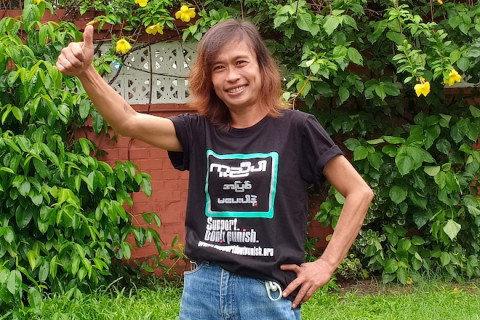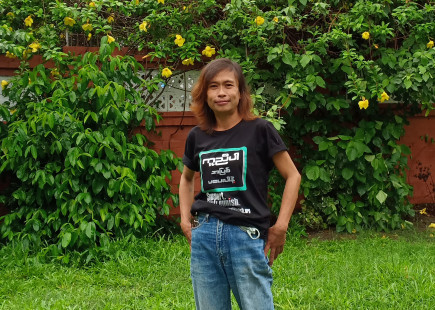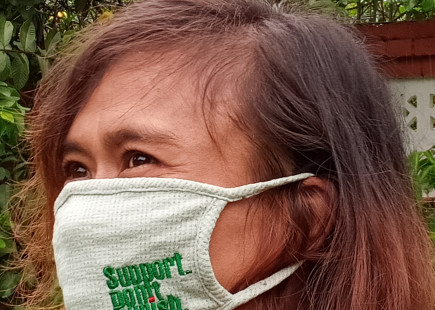‘Treat us like human beings’ - Life story of a woman who uses drugs in Myanmar
Regions
Publication date:
This commentary is part of the ten-day global campaign to end violence against women, in which the Drug Policy Advocacy Group – Myanmar (DPAG) also participates together with partners in Myanmar, including female sex workers, women living with HIV, and transgender people. DPAG’s campaign focuses on ending violence against women, including women who use drugs and other women facing intersecting inequalities. The campaign is coordinated by DPAG, and supported by the Sex Worker Network in Myanmar (SWIM), Myanmar Positive Women Network, Myanmar Youth Stars, and the Transnational Institute (TNI). For more information see DPAG’s Facebook page.


Pyae Phyo Aung
Introduction
Zarli Aye Kyaw is a woman who uses drugs from Yangon. She spent over four years in prison for being arrested in September 2014 for drugs use related issues. Zarli was originally sentenced to ten years, but was released in May 2019 following a mass Presidential Amnesty. Jail sentences prescribed by Myanmar drug laws are very lengthy, including for minor offences such as drug use and possession for personal use. The country’s prisons have problematic living conditions and are overcrowded. Access to health care in prisons remains challenging and often dependent on prisoners’ ability to pay bribes. Zarli below relates her life experience and the time she spent in Insein prison, the country’s largest and most infamous detention facility. Over the years, she worked as a peer educator on HIV related issues for a drug user network in Myanmar. She continued similar activities while incarcerated in prison.
A Commentary by Zarli Aye Kyaw
Hello everyone!
Everyone has a dream when they are young. My dream was to be a doctor. When I was in school, I was excellent at sports and I was also part of the selection of school sprint running team. However, my destiny changed, as I was forced to quit from school because I took part in political protests by students during 1988-1989. It was the start of ruining my life.
As I had a lot of free time, I started having a lot of friends and going to parties and nightclubs. I felt so proud to drink whiskey and smoke cigarettes, and then later also started using heroin, which we called ‘No.4’. At first I snorted heroin, and later on I started to inject it. At first, I used it just for fun and to try something new, and I was doing fine when I was not using it. Later, I started using it more frequently with my friends whenever we were having a good time or a bad time. At that stage, I really liked it.
When I became addicted to heroin, my life was torn apart, and I got HIV infected at that time. I felt my life was ruined, and I felt more and more disappointed at myself. Taking a daily dose of antiretroviral therapy (ART) for treatment of HIV for such a long time also made me feel terrible. At that stage, I was using heroin again and again, and then I was caught. When I was arrested, I was on methadone treatment, which is a substitute for heroin. I was arrested on Sunday 6 September 2014. Two days later, I was transferred from the Bahan Township Court to Insein Jail. I asked them if they could let me stay in custody at the police station for one month, but I found out that this could only be possible by bribing the police station officer. I did not have enough time to find money so I was forced to go to Insein jail in the blue colored prison car.
At that time, the head doctor from the Drug Dependency Unit of the Ywar Thar Gyi Mental Health Hospital called my brother, and said “my patient will be in trouble, you should come and take methadone for her”. He said this fully with love and compassion as a doctor. So my brother went to Ywar Thar Gyi to pick up methadone for me. The next day, my brother came to Insein Jail to visit me, and for the first time gave methadone to me in the women jail legally. It was because of the doctor’s signature and his compassionate effort for his patients to provide methadone at every possible place. It is really necessary to have such kind of doctors for us drug users. Because of the compassion of the staff, I could stay at the women hospital in Insein Jail for one month for free [without paying a bribe] and tailed off methadone, and got some necessary treatment for this. After that, I got discharged and was readmitted again in jail by the prison warden. Whenever I could meet with a medical staff who saw me as a patient to take care of, I could go to hospital for one more month again. When I was in the Insein Jail, although I was under custody care because I was not sentenced yet, most of the staff there treated me like a prisoner. I was discharged from the prison hospital and readmitted to jail again and again.
Then on 13 August 2015, I was sentenced to prison for ten years; six years for the charge of possession of narcotic drugs in hand, and another four years for the urine test being positive. But it could have been even longer, because Dr. Soe Naing from Alliance Myanmar came to the court and spoke out for me, and my sentence was reduced. I could have been sentenced for ten years for possession of narcotic drug under section 16/C of the law, and for another five years under section 15 of the law for the positive urine test. So the total sentence could have been fifteen years. But Dr. Soe Naing testified in court for me, and he said to the judge: “she was a drug user, but she helped a lot in social welfare activities with us. Also, her health is in bad shape. She is HIV positive and also has Hepatitis C. I really respect the law but please lower her sentence”. Because of that, I was sentenced for only ten years.

Pyae Phyo Aung
As I became a prisoner, I had to carry out some prison work, and at that time the head of the prison asked to meet me. I requested him to give me only some medical job related to HIV, and I showed him training certificates I obtained from UNODC, the Burnet Institute, and the Myanmar Anti-Narcotics Association. Without having to pay a bribe, I became a peer health care provider in prison. But then the prison warden asked me to take a break for one month from this activity. Every day after taking a bath, I went to the warden’s office to plea to get my job back, but I did not had a chance to meet her a single time. Every time they gave me different kinds of reasons. “Ma Ma Gyi (the warden) is ill, Ma Ma Gyi’s mom is ill, Ma Ma Gyi is angry, Ma Ma Gyi is in a bad mood”, and more like that. These experiences in jail that I got were only because of money. It was because I could not pay any bribe. After facing a lot of problems and started working as peer health care provider for the fellow-sufferer who are HIV positive, I felt inferior among the prisoners who lived at the hospital and acted as other health care providers [not working on HIV]. These prisoners also paid a bribe to become a health care provider in jail.
In the women’s hospital, there were no sufficient medicines to treat opportunistic infections related to HIV. There was no paracetamol and no vitamins, but you could get antibiotics. But most of the medicines were out of stock, so I had to please and plea with the prison medical staff to get medicines to treat opportunistic infections. As a peer health care provider, I needed to have stationary, such as pens and paper, and some medication like paracetamol. I could not buy these because I did not have money, but some of my peers helped me to get some medicines. Also some helped me to buy stationary, and one of the nurses from the hospital gave me a blood pressure monitor as a present.
As a peer health care provider, I got a lot of experiences. The worst case was with the lady with one star [a second lieutenant prison medical officer]. One of my peers’ CD4 count was under 350, but the prison doctor did not give her ART yet, so I asked why and she said because of the kidney status. This was true, as the patient’s body was already swollen. When the patient was hospitalized, the lady with one star wrongly gave that patient ART, whereas the doctor had earlier suggested giving Septrin, as prevention for opportunistic infection, and not ART. I conducted counseling sessions with that patient several times about ART, and at that time the patient showed me the ART she was taking. When I checked the patient’s medical book, I found out what the doctor had suggested. This is only known because the patient showed me. Also, on another occasion, one of the peer health care providers had a needle prick injury from when she took care of a pregnant woman with HIV, so the peer was afraid to get infected. This peer subsequently received some medication instead of post-exposure prophylaxis treatment [a short course of HIV medicine taken very soon after a possible exposure to HIV]. Therefore I told the peer this is not the medicine you should take. Please consult with the doctor from the National AIDS Program when he comes and visit the jail next time. When this doctor came and checked, I was right, they had given the peer the wrong medicine.
So many mistakes like this happened here and there. I am only sharing these situations in a positive way. The medical staff in jail only treated us as prisoners, but we also are human beings. Even though we are prisoners, as the prison hospital they should treat us as patients. The staff from the women prison hospital also should have HIV knowledge and training. And there also should be sufficient and proper medicines. “You guys have done whatever you wanted outside, but now you are scared to die and come to the clinic again and again” were the bitter words we heard from the prison medical staff. But whatever we have done outside, in the prison hospital they need to see us patients and treat us without error and provide full medical services.
Now I feel worried for my peers who are left behind in the prison, but there is nothing I can do for them. This why I would like to request the Ministry of Health and Sports to take care of prisoners who have HIV and also other prisoners with health problems, and provide them with necessary medical treatment. We drug users we have addition problems and are patients, and not criminals. Drug addiction is not a serious offence like treason, it is not a like a big crime. I am asking the leaders of the nation to please stop putting us in jail with heavy sentences, and please send us to drug treatment centers and rehabilitation camps. We drug users also have our own strengths and skills, and we would like to use these skills to help building up the nation. We want to be a part of it. Please see us as human beings. We want to become a good citizen and we want to have jobs, and we want to have a full life as other people. I do not want to live and die under stigmatizing words such as ‘addict’, ‘HIV positive’, or ‘ex-prisoner’. I do not want to waste my life under these stigmatizing words. I want to live my life fully. This is the message I would like to give to the head of state.